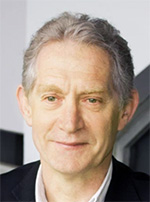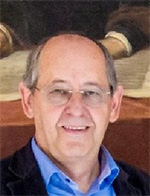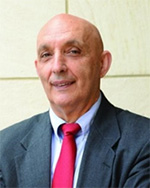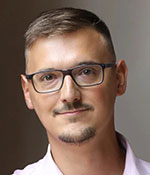
|
|  | |
|
Invited Speakers
About:
Michel Daydé received his PhD in Computer Science from Institut National Polytechnique de Toulouse, France, in 1986. From 1987 to 1995 he was a post-doctorate fellow, then visiting Senior Scientist, in the Parallel Algorithms Group at CERFACS. From 1988, he was Senior Lecturer and, from 2000, Professor at Ecole Nationale Supérieure d’Electrotechnique, d’Electronique, d’Informatique, d’Hydraulique et de Télécommunications (ENSEEIHT) from Institut National Polytechnique de Toulouse presently in the Networking and Telecommunication Department. Since 1996, he is a member of the Algorithmes Parallèles et Optimisation Group at Institut de Recherche en Informatique de Toulouse (IRIT), where he is now Head. IRIT is one the largest laboratories associated with CNRS in France, with around 800 people.
He is scientific representative at the CNRS Institute for Information Sciences and Technologies (INS2I) in charge of HPC, Grid and Cloud. He is also the Director the Orientation Committee for Scientific Computing within CNRS (COCIN) and is involved in various committees related to research (e-)infrastructures at CNRS and at national levels.
His current research interests are in high performance data analytics, high performance computing, computational kernels, full linear algebra, preconditioners for iterative solvers, large scale nonlinear optimisation on high-performance computers, and cloud and grid computing. He has also been involved in porting industrial codes on large-scale computing infrastructures.
|
| X |
Description:
The importance of calculus does not appear clearly to the general public, even though it is at the heart of changes in our societies. It has indirectly attracted a lot of attention from the general public nowadays with the impact of artificial intelligence which results both from the availability of huge volumes of data and enormous computer resources.
Modern science is now based on four pillars: after two founding pillars that are the experimental approach and theory, that of modeling and numerical simulation and even more recently that of large-scale data analysis (Big Data) and Artificial Intelligence are becoming major issues.
The talk is an attempt to cover the main topics related to supercomputing, from hardware to applications. We consider its evolutions over the years that are tighly coupled with the growing application requirements and we even go back to the origin of "calculus" (derived from the latin word small stone) in antiquity.
We enumerate some of the challenges related to applications in multiple areas that are crucial and are not actually only scientific since they have a considerable impact at the societal (e.g. energy, health, environment, defence and security), economic and financial (e.g. industrial competitiveness) and ethical (e.g. biology) levels. Modeling, simulation and artificial intelligence are increasingly appearing as decision support tools for a number of critical situations such as natural disasters and climate change.
In addition to major issues such as energy consumption of supercomputers, we also have a look to some of the emerging computing paradigms nowdays: quantum, neuromorphic and molecular / DNA computing.
|
| X |
|
|
About:
Dr. Peter Wittenburg is an Executive Director of Research Data Alliance Europe (RDA EU). He is also a member of the RDA Technical Advisory Board (TAB) and a scientific advisor of the EUDAT. He has a background in Electrical Engineering and Computer Science (Berlin).
Previously, at the Max-Planck-Gesselshaft Institutes (MPI), he led a technical group of about 30 experts in the field of psycholinguistics. He had setup labs at the MPI to research on a variety of digital signal processing techniques, such as focusing on real time eye tracking, gesture analysis and pitch detection. He is widely known for his leadership roles in the various projects and efforts funded by the European Union.
|
| X |
Description:
Trust is key for a Functioning Data Market and Exchange and therefore a key for the broad application of AI for society, science and industry. Despite all attempts in industry to develop data space technologies that enable tight control of data reuse, we still miss some essential attitudes and some key technologies to make a step towards improved data sovereignty, transparency, accountability and persistence (STAP) which define the state of a trust framework.
FAIR Digital Objects (FDO) not only implement the FAIR principles due to their machine actionability, but they can also act as a basic step to implement the STAP principles. In projects we also have shown that due to their construction they can bridge between different dataspaces as they are currently emerging. The talk will explain the FDOs, discuss some dataspace technology approaches, indicate why FDO can bridge between dataspaces and explain why FDOs can help implementing the STAP Principles.
|
| X |
|
|
About:
Dr. Sos Agaian is a Distinguished Professor of Computer Science at the Graduate Center and the College of Staten Island, CUNY. Before joining CUNY, he held the Peter T. Flawn Professorship at the University of Texas at San Antonio. He also served as a Visiting Professor at Tufts University and Lead Scientist at Aware, Inc. in Boston, Massachusetts. His research encompasses computational vision, machine learning, AI, multimedia security, remote sensing, and biomedical imaging.
Dr. Agaian has secured funding from NSF, DARPA, Google, and other agencies. He has published over 850 articles, 10 books, and 19 book chapters, and holds 56 patents/disclosures, many of which have been licensed. He has mentored 48 PhD students and has received multiple awards for his research and teaching, including the MAEStro Educator of the Year, the Distinguished Research Award, the Innovator of the Year, the Tech Flash Titans-Top Researcher Award, and recognition as an Influential Member of the School of Engineering at Tufts University.
He is an Associate Editor for several journals, including the IEEE Transactions on Cybernetics. He is a fellow of the Society for Imaging Science and Technology (IS&T), the Optical Society of America (SPIE), the American Association for the Advancement of Science (AAAS), the Institute of Electrical and Electronics Engineers (IEEE), The Asia-Pacific Artificial Intelligence Association (AAIA), the Armenian Society of Fellow (ASOF), a National Academy of Artificial Intelligence (NAAI) member, a Foreign Member of the Armenian National Academy, and a Member of Academia Europaea. He has delivered over 35 keynote speeches and 100 invited talks and has co-founded or chaired over 200 international conferences. Additionally, he has served as a Distinguished Lecturer of the IEEE Systems, Man, and Cybernetics Society.
|
| X |
Description:
Reliable environmental perception in autonomous driving remains challenging due to adverse weather conditions degrading image quality and compromising computer vision tasks. While traditional image processing methods struggle to mitigate these effects, this keynote introduces Quaternion Neural Networks (QNNs) as an innovative solution for robust scene understanding in difficult weather conditions. QNNs utilize four-dimensional quaternion numbers to efficiently process multidimensional visual data, capturing the intrinsic relationships between color channels and spatial features. This mathematical framework offers several advantages over conventional real-valued neural networks, including reduced parameters, enhanced generalization, and a natural handling of structural dependencies in visual data.
This talk will cover the fundamental principles of QNNs, including quaternion convolution operations and recent advancements in quaternion neural networks (QNNs). We will demonstrate their practical application in autonomous driving scenarios, highlighting superior performance in weather effect removal, semantic segmentation, and object detection in foggy, cloudy, and rainy conditions. Experimental results demonstrate that QNN-based approaches consistently outperform traditional real-valued networks in preserving scene details and maintaining perception reliability under adverse weather conditions, while requiring fewer parameters. The presentation will conclude with insights into future research directions and potential applications beyond autonomous driving
|
| X |
|
|
Description:
The problem of developing trusted artificial intelligence (AI) technologies is actively discussed by the global community, at the national level of individual countries (USA, China, Singapore, etc.), at the interstate level, and by large industrial companies (MITRE, Google).
In Russia, the task of mandatory implementation of trusted AI technologies in areas where their use may pose a threat to the security of the Russian Federation is enshrined in the National Strategy for the Development of Artificial Intelligence until 2030.
Despite active research and the availability of effective machine learning platforms, the creation of trusted AI remains a long-term problem. Without solving it, sustainable development of AI technologies and their widespread implementation in industry, healthcare, the social sphere, and other areas of life are impossible.
The development of trusted AI technologies is also important for commercial companies, since without their own trusted solutions it is impossible to ensure the competitiveness and safety of products. This presentation examines the key aspects of creating trusted AI systems. It describes the life cycle of such systems and the threats that arise during it.
Recommendations for countering these threats are provided. In addition, the report presents a set of tools developed at the Research Center for Artificial Intelligence of the ISP RAS to support these recommendations and methodologies. |
| X |
|
|
About:
Chris Lorenz is the Head of the Department of Engineering, King's College London. A Professor of Computational Materials Science, Chris received a combined BS/MS in chemical engineering at the University of Michigan in 1997. Chris continued on to earn his PhD in chemical engineering in 2001 at the University of Michigan, under the supervision of Prof. Robert Ziff, with whom he investigated ‘Chemical Engineering Applications of Percolation Theory.’
In 2001, Chris moved to Albuquerque, NM to work as a postdoc in Multi-scale Materials and Molecular Biology Simulations group at Sandia National Laboratories. In Dec. 2005, Chris moved to Ames, IA where he worked as a research fellow in the Physics Department of Iowa State University and Ames National Laboratory. Chris was appointed as a lecturer at King’s College London in May 2007.
Chris is very interested in using his expertise in molecular and atomistic scale simulations to study the structural and mechanical properties of materials in biological, colloidal, interfacial and ionic systems. Recently, some of the areas that have drawn his attention are:
- Electrokinetic effects of ionic solutions in silica nanochannels
- Interfacial behaviour of water near titanium and silicon oxide surfaces
- The effect of molecular structure on the self-assembly of block copolymers into micelles and thin films
- The structural properties of proteins near mixed lipid membranes and/or self-assembled monolayers
- The hydration of colloidal micelles and mixed lipid bilayers
- The structural properties of confined water between self-assembled monolayers
- The structural and nanotribological properties of self-assembled monolayers
- The mechanical properties of bio-derived epoxy adhesives
|
| X |
Description:
Over the past several years, we have used molecular dynamics simulations to investigate a wide variety of nanoparticles formed by soft matter ranging from surfactants to lipids to polymers to peptides.
Our investigations have been driven by understanding the internal and interfacial structure of the various formulations we have investigated, so that we could gain insight into the correlation between these properties and the function of the nanoparticle, whether that be drug delivery or biosensing.
Additionally, we have investigated the interactions of these nanoparticles with their environments including with lipid membranes. In doing so, we have developed various tools to build and analyse these simulations.
In this talk I will present a selection of these investigations and the tools that we have created to provide the insight that we have obtained.
|
| X |
|
| |
|






